RANSOM_MAKTUB.A
Win32/Filecoder.NGB (ESET), Trojan.Cryptolocker.N (Symantec)
Windows


Threat Type: Trojan
Destructiveness: No
Encrypted: Yes
In the wild: Yes
OVERVIEW
Downloaded from the Internet
This new ransomware variant is known for the unique graphic designs of its ransom notes. Similar to other ransomware variants, it encrypts files and arrives via email.
To get a one-glance comprehensive view of the behavior of this Trojan, refer to the Threat Diagram shown below.
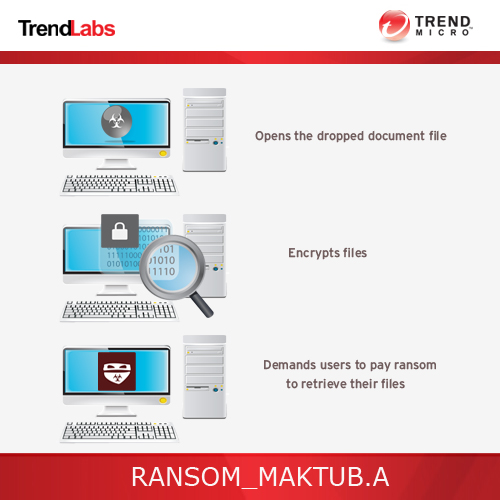
This Trojan arrives on a system as a file dropped by other malware or as a file downloaded unknowingly by users when visiting malicious sites.
TECHNICAL DETAILS
235,008 bytes
EXE
Yes
21 Mar 2016
Modifies files, Encrypts files
Arrival Details
This Trojan arrives on a system as a file dropped by other malware or as a file downloaded unknowingly by users when visiting malicious sites.
Installation
This Trojan drops the following files:
- %User Temp%\{random filename}.cab - archive containing the RTF document
- %User Temp%\{malware filename}.rtf - non-malicious document
- {folders containing encrypted files}\_DECRYPT_INFO_{extension name}.html - ransom note
- %User Temp%\{extension name}.gif - Maktub Locker logo
(Note: %User Temp% is the user's temporary folder, where it usually is C:\Documents and Settings\{user name}\Local Settings\Temp on Windows 2000, Windows Server 2003, and Windows XP (32- and 64-bit); C:\Users\{user name}\AppData\Local\Temp on Windows Vista (32- and 64-bit), Windows 7 (32- and 64-bit), Windows 8 (32- and 64-bit), Windows 8.1 (32- and 64-bit), Windows Server 2008, and Windows Server 2012.)
Other System Modifications
This Trojan modifies the following file(s):
- It encrypts files and appends a random extension to the encrypted files
Other Details
This Trojan encrypts files with the following extensions:
- apk
- arch00
- arw
- asset
- avi
- bar
- bay
- bc6
- bc7
- big
- bik
- bkf
- bkp
- blf
- blob
- bsa
- bup
- cab
- cas
- cat
- cdf-ms
- cdr
- cer
- cfr
- chm
- com
- cpl
- cr2
- crt
- crw
- css
- csv
- cur
- d3dbsp
- das
- dat
- dayzprofile
- dazip
- db0
- dba
- dbf
- dbfv
- dcr
- der
- desc
- dll
- dmp
- dng
- doc
- docm
- docx
- dot
- dotx
- drv
- dwg
- dxf
- dxg
- epk
- eps
- erf
- esm
- exe
- exif
- ff
- flv
- fon
- forge
- fos
- fpk
- fsh
- gdb
- gho
- gif
- gpd
- hkdb
- hkx
- hlp
- hplg
- htm
- html
- hvpl
- ibank
- ico
- icxs
- idl
- ifo
- indd
- inf
- inf_loc
- ini
- itdb
- itl
- itm
- iwd
- iwi
- jfif
- jpe
- jpeg
- jpg
- js
- kdb
- kdc
- kf
- layout
- lbf
- lck
- lib
- litemod
- lnk
- log
- log1
- log2
- lrf
- ltx
- lvl
- m2
- m3u
- m4a
- man
- manifest
- map
- mcgame
- mcmeta
- mdb
- mdbackup
- mddata
- mdf
- mef
- menu
- mht
- mlwivc
- mlx
- mof
- mov
- mp4
- mpg
- mpp
- mpqge
- mrw
- mrwref
- msg
- msi
- msp
- mui
- mum
- ncf
- nef
- nlp
- nls
- nrw
- ntl
- ocx
- odb
- odc
- odm
- odp
- ods
- odt
- orf
- p12
- p7b
- p7c
- pak
- pdb
- pdd
- pef
- pem
- pfx
- pgp
- pkpass
- pnf
- png
- ppd
- ppsx
- ppt
- pptm
- pptx
- psd
- psk
- pst
- ptx
- py
- qdf
- qic
- r3d
- raf
- raw
- rb
- rdp
- re4
- regtrans-ms
- resx
- rgss3a
- rim
- rofl
- rtf
- rw2
- rwl
- sav
- sb
- sc2save
- scr
- shs
- sid
- sidd
- sidn
- sie
- sis
- slm
- snx
- so
- sql
- sr2
- srf
- srw
- sum
- svg
- swf
- syncdb
- sys
- t12
- t13
- tax
- tc
- thm
- thmx
- tif
- tor
- ttf
- txt
- unity3d
- upk
- vcf
- vdf
- vfs0
- vob
- vpk
- vpp_pc
- vsd
- vtf
- w3x
- wallet
- wav
- wb2
- wma
- wmf
- wmo
- wmv
- wotreplay
- wpd
- wps
- x3f
- xdr
- xf
- xlk
- xls
- xlsb
- xlsm
- xlsx
- xml
- xrm-ms
- xsd
- xxx
- ztmp
NOTES:
This malware deletes shadow copies by executing the following command:
%System%\vssadmin.exe delete shadows /all /Quiet
It opens the dropped document file:
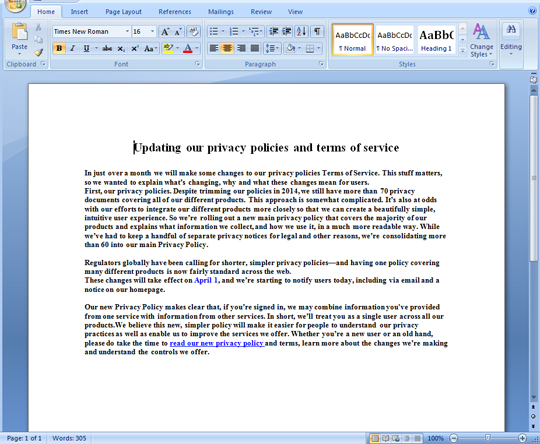
It displays the following window after file encryption:
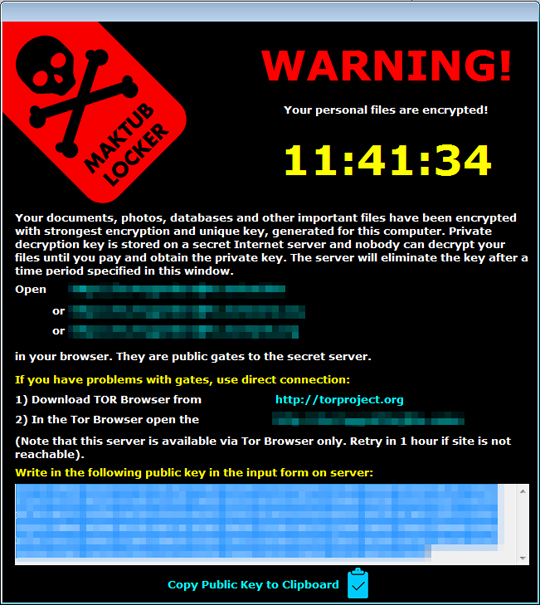
The dropped html component contains the ransom note:
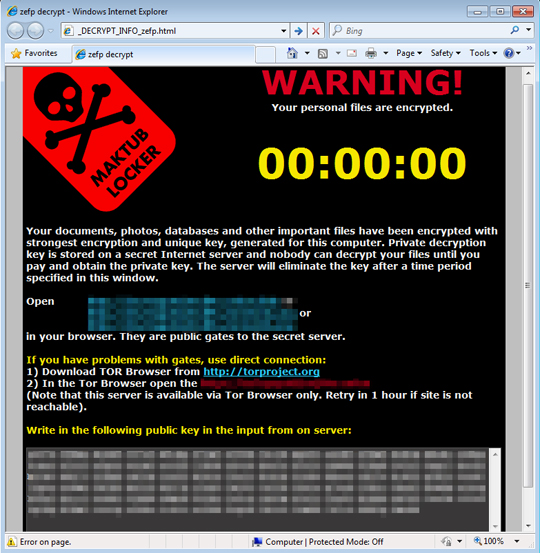
Upon visiting the website, it asks for the decryption key:
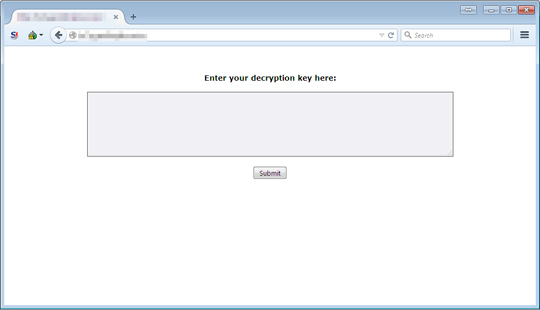
It then redirects users to the main webpage:
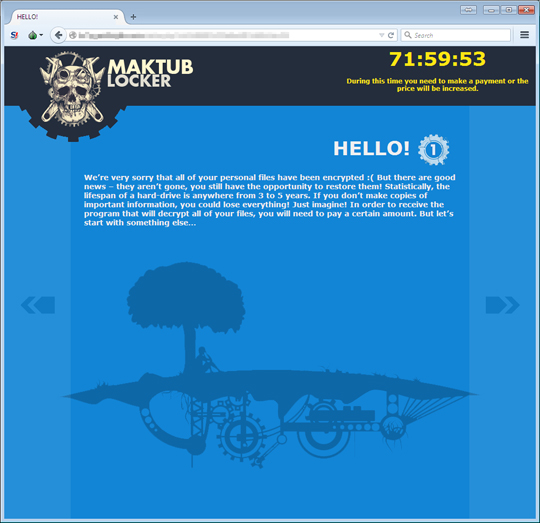
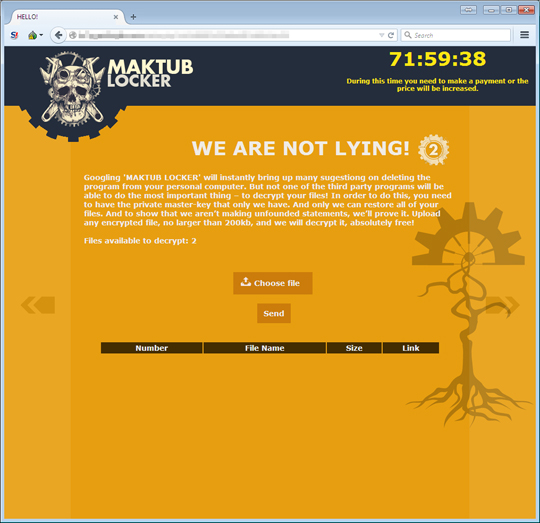
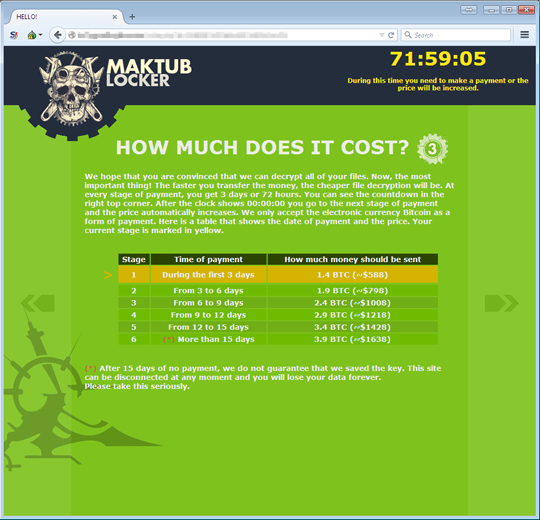
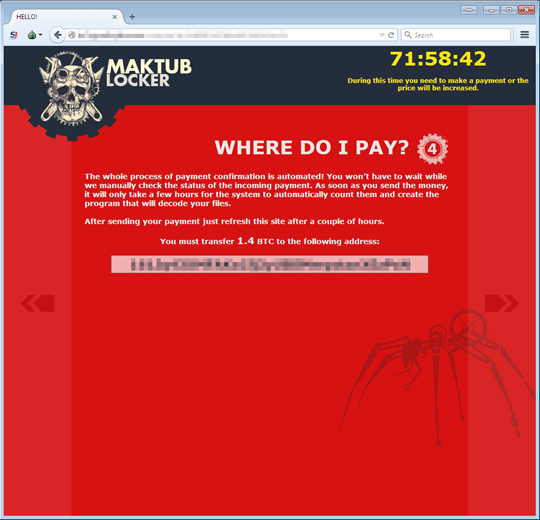
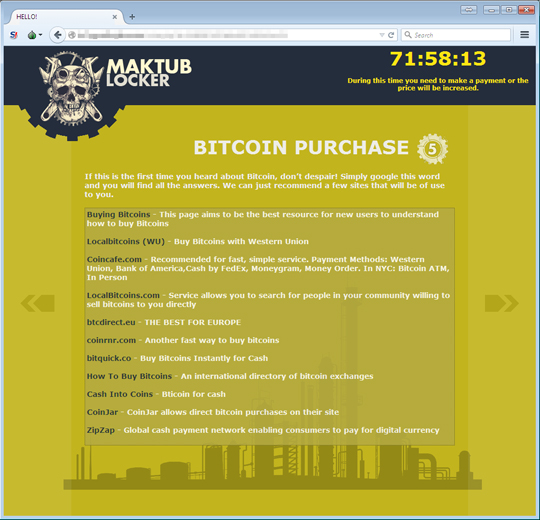
SOLUTION
9.800
12.416.07
21 Mar 2016
12.417.00
22 Mar 2016
Step 1
Before doing any scans, Windows XP, Windows Vista, and Windows 7 users must disable System Restore to allow full scanning of their computers.
Step 2
Note that not all files, folders, and registry keys and entries are installed on your computer during this malware's/spyware's/grayware's execution. This may be due to incomplete installation or other operating system conditions. If you do not find the same files/folders/registry information, please proceed to the next step.
Step 3
Identify and terminate files detected as RANSOM_MAKTUB.A
- Windows Task Manager may not display all running processes. In this case, please use a third-party process viewer, preferably Process Explorer, to terminate the malware/grayware/spyware file. You may download the said tool here.
- If the detected file is displayed in either Windows Task Manager or Process Explorer but you cannot delete it, restart your computer in safe mode. To do this, refer to this link for the complete steps.
- If the detected file is not displayed in either Windows Task Manager or Process Explorer, continue doing the next steps.
Step 4
Search and delete this file
- %User Temp%\{random filename}.cab
- %User Temp%\{malware filename}.rtf
- %User Temp%\{extension name}.gif
- {folders containing encrypted files}\_DECRYPT_INFO_{extension name}.html
Step 5
Scan your computer with your Trend Micro product to delete files detected as RANSOM_MAKTUB.A. If the detected files have already been cleaned, deleted, or quarantined by your Trend Micro product, no further step is required. You may opt to simply delete the quarantined files. Please check this Knowledge Base page for more information.
Step 6
Restore encrypted files from backup.
Did this description help? Tell us how we did.

